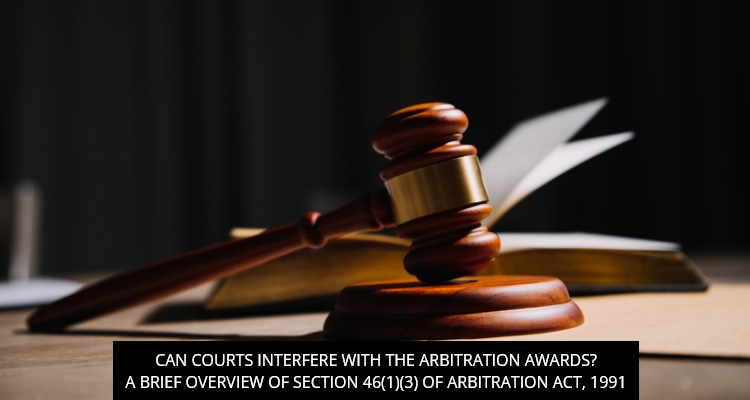
The applicability of foreign arbitral verdicts is becoming more and more practicable due to the less formal and consensual nature of modern arbitration systems. Arbitration undoubtedly makes it easier to accomplish the desired results more quickly than through traditional court procedures, but the arbitration process does not end when the arbitral ruling is made.
The parties must take care of the recognition and execution of the arbitral judgment after it has been issued. To put it another way, a court order accepting the arbitral decision is always necessary.
Currently, the principal piece of legislation for the enforcement and recognition of arbitral awards at the domestic level within the province is dealt with by the Arbitration Act, 1991. S.O. 1991, c. 17 (“the Act”).
The framework with regard to the interference of courts with arbitral awards is highlighted in this blog post. In order to understand whether courts can interfere with arbitration awards, let’s look at the case of Mensula Bancorp Inc. v. Halton Condominium Corporation No. 137.
Can Courts Really Interfere With The Arbitration Awards?
In Mensula Bancorp Inc. v. Halton Condominium Corporation (HCC 137), the disagreement revolved around the issue of Mensula’s parking spaces which are situated on one of the floors of the HCC 137 condominium’s parking garage.
In particular, HCC 137 and Mensula disputed whether Mensula’s staff and other attendees were allowed to enter the parking lots via the residential condominium building’s lobby and hallways or exclusively through an exterior stairway.
Section 132(4) of the Condominium Act, 1998 requires the parties to opt for mediation and arbitration mechanisms in the event of a disagreement. Therefore, the parties initially proceeded to arbitration and the decision of the arbitrator came out in favor of HCC 137.
Following the arbitrator’s ruling made in favor of HCC 137, the Mensula approached successfully the Superior Court of Justice to have the arbitrator’s award nullified. Mensula’s stance relied on section 46(1)(3) of the Act which empowers the court to invalidate the arbitral award if the award pertains to a dispute that is not covered by the arbitration agreement or covers the dispute that is outside the purview of the agreement.
The application court, therefore, ruled that:
- a result of the arbitration that was not supported by the declaration’s language and by using extenuating circumstances exceeding their proper bounds in the interpretive process, the arbitrator had “in effect” altered the condominium declaration.
- although the question of Mensula’s access to the parking units was legitimately before the arbitrator, the application judge ruled that the arbitrator could only resolve that issue by reading the condominium declaration and not by changing it.
Guiding Case Law In Mensula
In Mensula, the application court took into consideration the case of Alectra Utilities Corporation V. Solar Power Network Inc. where the decision of a judge was overturned who declared the arbitrator’s interpretation of the agreement unreasonable and deemed it a jurisdictional error.
Simply put, the judge assumed that an incorrect interpretation of an agreement permitted the court to set aside the award in the context of section 46(1)(3) of the Act.
It is imperative to note that the court in Alectra Utilities Corporation ruled that section 46(1)(3) of the act provides little scope for the court’s interference with the arbitration award. The narrow scope of section 46(1)(3) alludes that substance of the dispute between the parties is clearly excluded from being debated.
Interpretation Of The Agreement Is For The Arbitrator And Not The Court
One major issue in Mensula was the question of whether Mensula should have access to the condominium’s common areas and, if so, the extent of that access, was pertinent to the appeal. So, what arbitrator did?
He summarized the parties’ views as concerning declaration interpretation. The arbitrator evaluated the condominium declaration in reaching his conclusion and resolving the issues before him. In the end, the arbitrator by interpreting the declaration determined that Mensula had access exclusively via the east-end stairs.
The Court of Appeal ruled that it didn’t matter whether the arbitrator appropriately or substantially read the condominium’s declaration. The arbitrator definitely had the authority to interpret the declaration, according to the Court of Appeal.
We Can Guide You!
If you or someone you know needs legal help in navigating the landscape of domestic and international arbitrations, please contact our lawyers at Ayaz Mehdi Professional Corporation.
Disclaimer: Kindly note that sending or receiving information through this site does not establish a solicitor-client relationship. Legal matters are fact-specific, and the law is variably changing. The views expressed and the content provided on this blog are general guidelines and cannot substitute for proper legal advice. Schedule your legal consultation by clicking here: Let’s meet!






